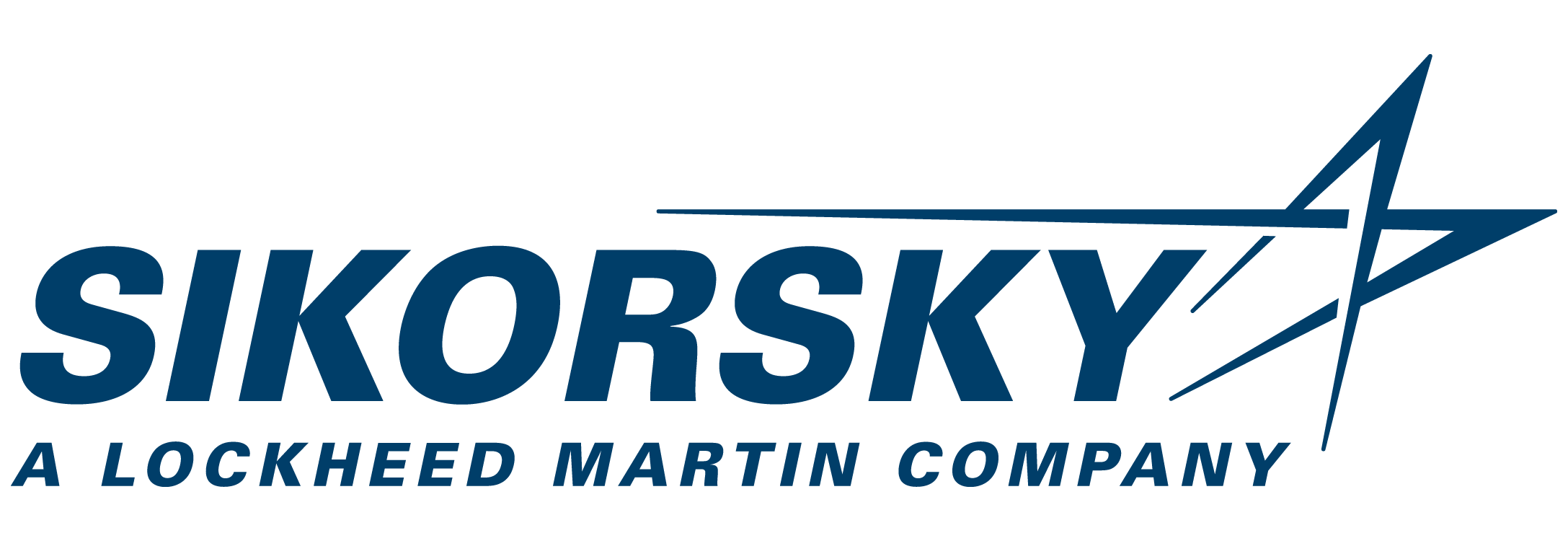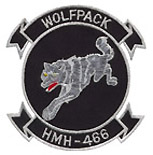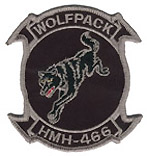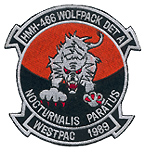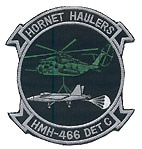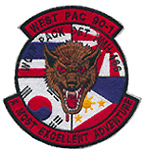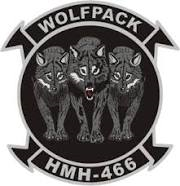
HMH-466 Squadron Patch
History of HMH-466
Marine Heavy Helicopter Squadron 466 (HMH-466), the “Wolfpack,” was commissioned on 30 November 1984, as the Marine Corps’ third, and Marine Aircraft Group 16’s (MAG-16), second CH-53E squadron. By December 1984, the squadron was 180 Marines strong and growing, and had accepted two of sixteen CH-53E Super Stallion helicopters from Sikorsky Aircraft Company in Stratford, Connecticut.
The Wolfpack conducted its first operation flight on 19 December 1984, and by 30 June 1985, the squadron had accepted eleven of its sixteen aircraft. In its first seven months as an operational squadron, HMH-466 had flown 1100 hours, carried 1000 passengers, and lifted 175,000 pounds of cargo. Delivery of aircraft continued until 5 August of 1985, when the squadron received its sixteenth CH-53E.
In the past 28 years, the Wolfpack has participated in thirteen Marine Expeditionary Unit, Special Operations Capable (MEU (SOC)) deployments and has been the recipient of many prestigious awards, including the Secretary of Defense (SECDEF) Phoenix Award for outstanding maintenance (1987), the Fleet Marine Force Pacific (FMFPAC) Annual Aviation Safety Award (1986), the Mike Yunck Award for the best overall squadron in the Third Marine Aircraft Wing (3d MAW) (1988,1999,2011), a Joint Meritorious Unit Award (1993), the Meritorious Unit Citation (MUC) (1986,1987,1998,2002,2010), the Navy and Marine Corps Unit Commendation (NUC) (1991,2003,2005,2007,2009), the Presidential Unit Commendation (PUC) (2010), the Keith B. McCutcheon Award for Heavy Lift Squadron of the Year (1999, 2006,2010), and the Chief of Naval Operations (CNO) Aviation Safety Award (1999,2004,2005,2006,2009,2012).
When Iraq invaded Kuwait in August of 1990, the Wolfpack became the first CH-53E squadron to deploy to Saudi Arabia. While in support of operations DESERT SHIELD and DESERT STORM, HMH-466 recovered downed aircraft, conducted the first Night Vision Goggle (NVG) troop insertion, and provided heavy lift support from port facilities to staging areas in preparation for the ground phase of the operation. Upon cessation of hostilities, the Wolfpack returned to Marine Corps Air Station (MCAS) Tustin having sustained no losses of personnel or aircraft.
In May of 1992, the Wolfpack embarked upon its first Unit Deployment Program (UDP) to MAG-36, MCAS Futenma, Okinawa, Japan and became the second CH-53E squadron deployed to the Western Pacific. In addition, the squadron detached four aircraft to Marine Medium Helicopter Squadron 161 (HMM-161) in support of the 11th MEU (SOC). In November 1992, HMH-466 returned to MAG-16 thus concluding the first of many extremely successful six-month UDP rotations.
From December 1992 to March 1993, the Wolfpack detached four aircraft to Somalia in support of Operation RESTORE HOPE. In November 1993, the squadron celebrated its ninth birthday. During this month, the Wolfpack attained 25,000 flight hours, becoming the only CH-53E squadron to reach this class “A” mishap-free milestone. The squadron again deployed to the Western Pacific in May 1994, detaching four aircraft to both HMM-161 and HMM-262 in support of the 15th and 31st MEU (SOC)s, respectively.
On 29 May 1995, the Wolfpack became the first Marine Corps CH-53E squadron to exceed 30,000 mishap-free flight hours. During October 1995, the Wolfpack detached four aircraft to HMM-163 in support of the 13th MEU (SOC) while the main body of the squadron departed for Okinawa, Japan in May of 1996. During the deployment a CH-53E Fleet wide grounding for faulty main rotor head swash plates kept the squadron hard at work rebuilding eight aircraft. Upon the completion of the UDP in November of 1996, the squadron returned to MCAS Tustin.
Following a successful Okinawa deployment, the Wolfpack continued to support Marine Corps forces throughout the continental United States (CONUS). In january and February of 1997, the Wolfpack supported various units at the Mountain Warfare Training Center (MWTC) in Bridgeport, California. October was spent at 29 Palms, California, supporting the Combined Arms Exercise (CAX), and December concluded with the squadron focused on preparations for the next deployment to Okinawa.
With another UDP under way, the squadron also supported three separate MEU (SOC)s with detachments stretched across the globe. In conjunction with the Base Realignment and Closure Commission (BRAC) direction, the squadron relocated from MCAS Tustin to MCAS Miramar following their return from UDP.
In February of 2000 the Wolfpack again detached four aircraft to the 13th MEU (SOC). Deploying with HMM-161 aboard the USS Tarawa the detachment performed missions in East Timor, as well as supporting the withdrawal of the USS Cole from the Persian Gulf after the ship was attached by terrorist while at port in Yemen.
Throughout 2001, the Wolfpack participated in three CAXs and supported two Weapons and Tactics Instructor Courses (WTI). In may of 2001 the Wolfpack also supported President Bush during his first visit to California as President. Later that year, the squadron shifted its focus to aircrew training for the upcoming 11th MEU (SOC) detachment as well as another UDP to Okinawa in June of 2002.
The UDP proved to be a diverse deployment for the squadron. Flying across the Western Pacific rim, the heavy lift community was well represented by the Wolfpack in operations such as BALAKITAN in the Philippines and COBRA GOLD in Thailand. Upon its return to MCAS Miramar in July of 2003, the Wolfpack had completed a thirteen month deployment, the longest in squadron history.
In August 2003, the Wolfpack supported HMX-1 and President Bush during his visit to Los Alamitos, California and later in the year provided six aircraft and the requisite maintainers to support WTI 1-04.
Tragedy struck the San Diego community in October of 2003, as 400,000 acres of land were burned by wildfires. Rising to help the community, the Wolfpack launched six aircraft, each carrying 1320 gallon water buckets, to provide much needed assistance to beleaguered fire fighters as they quelled the expansive blaze.
December was a month of preparation as the squadron set its eyes on training. Spending time in Indian Springs, Nevada and Yuma, Arizona the Wolfpack sharpened their skills as they readied to deploy to Iraq.
In January 2004, an unprecedented maintenance effort culminated in the launching and embarkation of sixteen aircraft aboard the USS Boxer for transport to the Persian Gulf. The squadron’s main body personnel joined the aircraft aboard ship in February. The Wolfpack carried eleven 13,000 pound tugs and offloaded HMM-261 from the USS Bataan before flying all sixteen aircraft 350 miles north to Al Asad Airbase in Central Iraq.
Operating with minimal logistics support, electricity, and communications, the Wolfpack adapted and became the first USMC frag-capable squadron in country for Combined Joint Task Force 7 (CJTF-7). While deployed, the squadron flew 3,774.9 hours, and transported over 8,530 passengers and 6.4 millions pounds of cargo in support Operation IRAQI FREEDOM II-1 (OIF). In addition, the squadron was recognized by the Secretary of the Navy for surpassing the 50,000 hour class “A” mishap-free milestone during the deployment.
Upon returning home the Wolfpack took some much deserved leave and then settled into the stateside routine of training and preparing for another deployment. During the squadron’s homestead it supported two separate WTI classes, WTI 1-05 and 2-05, participated in Exercise DESERT TALON with MAWTS-1 in Yuma, Arizona, and conducted its own pre-deployment training to ready the squadron for another trip to Iraq.
On 21 September 2005 the Wolfpack departed Miramar for its deployment in support of OIF 04-06.2. The squadron hit the ground running and accomplished many missions to include High Value Individual (HVI), Very Important Person (VIP) lifts and raids like that of the Secretary of Defense in Amman, Jordan along with Tactical Bulk Fuel Delivery System (TBFDS) refueling missions, Tactical Recovery of Aircraft and Personnel via external lift, and general support of ground forces operating throughout Iraq. And on 18 February 2006 the Wolfpack achieved another noteworthy milestone by surpassing 60,000 class “A” mishap-free flight hours.
With another successful deployment under their belt, the Wolfpack returned to Miramar and again began the preparation for another deployment.
In April 2007 the Wolfpack again departed CONUS for Al Asad, Iraq. Shortly into the deployment the squadron welcomed its four aircraft from the 13th MEU (SOC) as they were detached from the 13th MEU still operating in the Middle East to support Multi-National Forces-West (MNF-W) in Iraq, a first in the CH-53E community. Throughout the deployment the squadron completed a multitude of missions and safely returned home to MCAS Miramar in November of 2007 after flying an impressive 4,300 combat flight hours and 2,400 sorties, while transporting over 3.9 million pounds of cargo and 23,000 passengers. On 19 November, the squadron surpassed 70,000 Class-A mishap free flight hours.
December 2007 to September 2008 again marked the transition from post deployment back into the training regime for yet another OIF deployment. The Wolfpack completed five pilot and two enlisted NSI checks along with supporting WTI 2-08. In June 2008, not long into preparations for the upcoming deployment, the squadron paused to see off a four aircraft detachment that would join with HMM-163 to support the 13th MEU (SOC).
In September 2008, the advanced party departed for Operation IRAQI FREEDOM. The squadron’s main body deployed in October 2008 and from Kuwait the squadron sent a four aircraft detachment to Kandahar, Afghanistan in support of the Special Purpose MAGTF – Afghanistan (SPMAGTF-A). In support of OIF, HMH-466 sent four aircraft to Sahl Sinjar, Iraq where they participated in combat operations in the Ninawa Province as part of a hastily formed Helicopter borne Task Force (HTF). HMH-466 was the first heavy lift squadron to support combat operations in two operational theaters of war.
In addition to combat operations in Ninawa Provence, the main body in OIF provided General Support (GS) to a multitude of other elements within Area of Operation (AO) Tripoli, primarily 1st Light Armored Reconnaissance Battalion. This was in addition to the enduring General Support commitment for MNF-W in Al Anbar Provence. Meanwhile in Afghanistan, the primary mission for HMH-466 Detachment B was General Support for the emerging SPMAGTF-A in the Helmand and Farah provinces. This meant that the majority of the missions were in support of the Ground Combat Element (GCE), Regimental Combat Team (RCT)-3 and 3rd Battalion 8th Marines.
The squadron returned from OIF and OEF in March 2009 and immediately began training for a nine month turnaround back to OEF. Within 30 days of return, the squadron was tasked with a three aircraft division to support the then current Assistant Commandant of the Marine Corps, General Amos. During the following months, the squadron conducted training at Creech AFB, supported WTI 2-09, and prepared for future deployments at Enhanced Mojave Viper (EMV), located at 29 Palms, California.
In December 2009, the squadron received the order to deploy the advance party Marines to Operation Enduring Freedom (OEF) three weeks ahead of schedule. In truly Wolfpack fashion, the squadron enthusiastically prepared for the abbreviated deployment timeline sending 45 Marines to Afghanistan with the main body deploying just after the New Year.
In January 2010, HMH-466 took over heavy lift combat operations in Camp Bastion, Afghanistan in support of Operation ENDURING FREEDOM (OEF) 10.1. In-theater integration began when the squadron was joined by HMH-464. The newly formed cohesive combat unit, “HMH-America”, immediately began preparing for Operation MOSHTARAK in Marjeh. Operation MOSHTARAK was the largest helicopter borne raid of OEF requiring eight CH-53E’s and an additional four CH-53D’s. HMH-America provided eight CH-53E’s and inserted the Marines that began the liberation of the largest insurgent stronghold in the Helmand Province. HMH-466 participated in 21 other named operations in support of both US, Afghan, and British forces.
Also notable was the Tactical Recovery of Aircraft and/or Personnel (TRAP) missions conducted in Afghanistan. For the first time a CH-53E recovered a 23,000 pound Joint Special Operations Task Force MH-47G Chinook near Kandahar, and a U.K. 18,000 pound Mk3 Merlin helicopter that crashed in a non-hostile event at a FOB in Nad e Ali. Throughout the deployment, over 35,700 passengers and nearly 8.5 million pounds of cargo, 5255 flight hours and 3,400 combat sorties were flown.
In August 2010, the squadron returned stateside from OEF and settled back into training operations. Joined by new pilots and aircrew, the squadron supported the 2010 Miramar Airshow, 2010 San Francisco Fleet week, EMV 1-11, a presidential visit to Los Angeles, and a MAG 16 led evaluation of the long range capability of the CH-53E to Fort Hunter Liggett, CA. On 17 November 2010, the squadron surpassed the milestone of 80,000 flight hours without a Class-A mishap.
In 2011, the Wolfpack conducted several training and support operations to include the MCAS Yuma Airshow, WTI 2-11, San Francisco Fleet Week, and Operation Dawn Blitz aboard the USS Essex. In April, HMH-466 supported the President of the United States by flying two aircraft to San Francisco in support of Marine Helicopter Squadron 1 (HMX-1).
On 26 January 2012, the Wolfpack arrived at Camp Bastion, Afghanistan and took over heavy lift combat operations in support of OEF 12.1. The Wolfpack worked with British SAS and Australian Task Force 66 conducting drug interdiction operations and the transport of High Value Targets (HVT). These operations led to the seizure of over $10 million dollars worth of narcotic drugs. The squadron participated in Operation JAWS, a six month on going operation to improve security in the Helmand Province. In Operation UNITED HORIZON, the squadron contributed four of the twenty aircraft flown to transport 480 Marines to the Sangin Valley. In all, the Wolfpack flew 222 named operations, conducted 27 raids, logged 4,370 flight hours, and transported over 4.1 million pounds of cargo in OEF 12.1.
While operations were being conducted in Afghanistan, a detached element of HMH-466 was conducting operations with the 31st MEU in Okinawa, Japan. The highlight of the deployment was a long range raid exercise involving a four aircraft movement of over 900 miles from Okinawa to Camp Fuji, Japan. While deployed on the 31st MEU, HMH-466(-) flew for 458.7 hours and transported over 184,000 pounds of cargo.
On 8 June, the squadron returned from the 31st MEU. At the end of August, the Wolfpack returned to a full 1.0 with the return of the main body from OEF and the squadron quickly transitioned into training for future operations. In October, HMH-466 supported the Miramar Airshow with three aircraft, one of which participated in the Marine Air Ground Task Force (MAGTF) demonstration. The Wolfpack continues to train in preparation for future combat operations.
